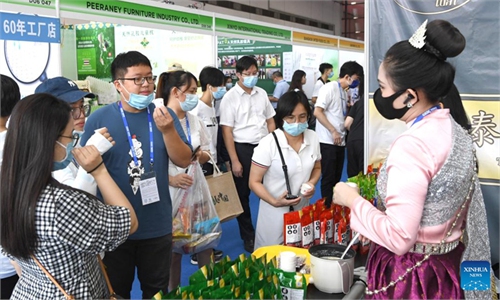
Performers play Indonesian music during the 19th China-ASEAN Expo at the Nanning International Convention and Exhibition Center in Nanning, south China's Guangxi Zhuang Autonomous Region, Sept. 16, 2022.Photo:Xinhua
Malaysia companies continue to show their confidence in the Chinese market, boosted by the Regional Comprehensive Economic Partnership (RCEP) in the hope of accessing more market opportunities in the world's second largest economy.Prior to the RCEP coming into effect, 64.6 percent of Malaysia's tariff items enjoyed zero tariff treatment with RCEP contracting parties, and eventually 90 percent of tariff items will enjoy zero tariff after entry, which will mean growth opportunities for a quarter of Malaysia's exports, and "allows us to enjoy the huge market" represented by RCEP member countries, Lisy Lee, Chairman of PETRONAS China, told the Global Times on Monday.
Monday was the last day of the four-day China-ASEAN Expo held in Nanning, capital of South China's Guangxi Zhuang Autonomous Region, the first edition of the annual event since the RCEP was implemented, and where government officials and trade experts alike urged more efforts to familiarize businesses with RCEP rules.
The implementation of the RCEP has provided opportunities for energy companies. The Chinese market is vast and resilient, which is crucial to our global business strategy. Looking back on our development in China, we are full of confidence in China's economic environment, Lee said.
At present, PETRONAS has three major businesses in China: PLI China, PCMC and LNG.
The company's Chinese natural gas business started in 2006, when the company signed the first long-term agreement for LNG in China with Shanghai Shenergy Group for a period of 25 years, and delivered its first LNG shipment in 2009
As the fourth largest LNG provider in China, the company has delivered more than 1,100 LNG shipments to the Chinese market as of the end of 2021. In 2021 alone, the company delivered a total of 8.2 million tons of LNG to China.
"We hope to have more cooperation on new energy solutions such as solar energy, wind energy and hydrogen energy", she said.
Malaysia became the 12th signatory country on March 18, 2022 to implement the RCEP agreement.
"All countries now have to get their economies back on their feet and [the] RCEP focuses on two things, which [are] to reduce tariffs, and to facilitate trade. It has a very important role to play," Malaysian Ambassador to China Raja Dato' Nushirwan Zainal Abidin told the Global Times on the sidelines of the expo over the weekend.
Studies by the ASEAN bloc show that Malaysia is likely to benefit the most from the RCEP and the benefits are likely to hit $200 million, the ambassador said.
A recent example of RCEP-enabled opportunities was the signing of a $326 million project during the CAEXPO over the weekend - the Malaysia-China Kuantan International Logistics Park.
China has been Malaysia's largest trading partner for 13 consecutive years, and Malaysia is China's second largest trading partner in ASEAN, and tenth largest trading partner globally.
In 2021, bilateral trade volume between China and Malaysia reached $176.8 billion, a year-on-year increase of 34.5 percent. While bilateral trade has grown, investment cooperation has continued to rise. By the end of 2021, China's cumulative direct investment in Malaysia exceeded $10 billion, while Malaysia's cumulative direct investment in China was nearing $8 billion.
Global Times



